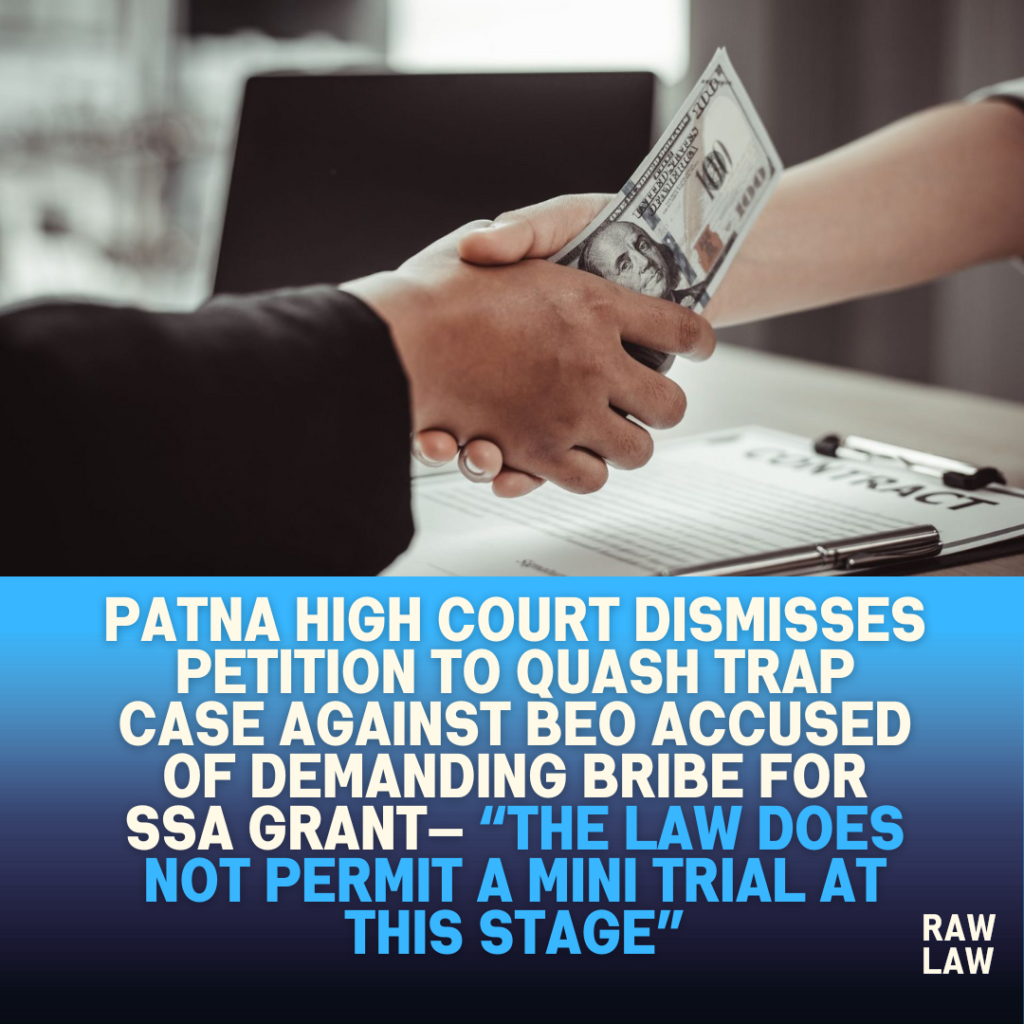Court’s Decision:
The Patna High Court dismissed the petition filed under Section 482 CrPC challenging the cognizance and charge framed under Section 7 of the Prevention of Corruption Act, 1988, holding that issues related to the veracity of evidence and defence contentions cannot be examined at the stage of framing of charge. The Court reaffirmed that “the law does not permit a mini trial at this stage.”
Facts:
The case arose from an FIR registered by the Special Vigilance Unit (SVU), Bihar, based on a complaint dated 08.02.2024 from a Headmaster alleging that the Block Education Officer (petitioner) demanded a bribe of ₹10,000 for the release of SSA Grant and Mid-Day Meal funds, threatening departmental action in case of non-payment. Following verification by the SVU, a trap was laid, and the petitioner was allegedly caught red-handed with the bribe money.
Issues:
- Whether the cognizance and charges framed under Section 7 of the P.C. Act are sustainable.
- Whether the defence arguments and procedural lapses justify quashing the proceedings under Section 482 CrPC.
Petitioner’s Arguments:
The petitioner contended that the FIR, verification, and trap were conducted with suspicious haste, casting doubt on their genuineness—especially since Patna and Patahi are over 200 km apart. It was argued that the trap witnesses were SVU-selected employees from Patna and not independent. Further, inconsistencies were highlighted, such as the alleged right-hand bribe acceptance conflicting with the chemical wash report indicating pink coloration on the left hand. It was submitted that the charge-sheet was filed before securing sanction for prosecution, and the entire investigation was vitiated by bias stemming from the petitioner’s professional disputes with the complainant.
Respondent’s Arguments:
SVU, through its counsel, contended that at the charge-framing stage, the Court must presume the prosecution’s materials to be true. The veracity of the trap, inconsistencies in evidence, or questions of malicious intent are factual matters to be adjudicated during trial and cannot be preempted at this stage. The petitioner, they argued, was trying to seek a mini trial under the guise of a discharge application, which is impermissible in law.
Analysis of the Law:
The Court reaffirmed the limited scope of judicial scrutiny at the stage of framing charges. Relying on established principles under Section 227 CrPC, the Court reiterated that probative value of materials is not to be tested at this stage and the defence of the accused cannot be evaluated.
Precedent Analysis:
The Court relied on the following judgments:
- State of Haryana v. Bhajan Lal (1992 Supp (1) SCC 335): Principles for quashing of FIRs elaborated.
- State of Tamil Nadu v. N. Suresh Rajan (2014) 11 SCC 709: Courts must proceed on an assumption that prosecution’s material is true and cannot evaluate its sufficiency for conviction at the charge stage.
- State of Rajasthan v. Ashok Kumar Kashyap (2021) 11 SCC 191: At the stage of framing of charge, only existence of prima facie case is relevant, not its ultimate success.
- CBI v. Eluri Srinivasa Chakravarthi (2025 SCC OnLine SC 1215): Accused has no right to file defence material at charge-framing stage; a mini-trial must be avoided.
Court’s Reasoning:
The Court held that the petitioner’s arguments regarding procedural irregularities, witness credibility, and contradictions in evidence are matters of trial and cannot form the basis for quashing charges under Section 482 CrPC. “Transcript of conversation, chemical analysis, and alleged official disputes are issues of trial and not to be assessed at the stage of charge framing,” the Court noted.
Conclusion:
The High Court refused to interfere with the order of cognizance and framing of charge. It held the petition to be devoid of merit and dismissed it, stating:
“The law does not permit a mini trial at this stage… the defence version cannot be considered.”
Implications:
The judgment is significant in reiterating judicial restraint at the pre-trial stage in corruption cases. It sends a message that procedural irregularities or factual disputes must be tested during trial and cannot derail prosecutions at the threshold. The judgment strengthens the principle that courts should not pre-judge the reliability of prosecution materials while framing charges.
Summary of Cases Referred:
- State of Haryana v. Bhajan Lal (1992 Supp (1) SCC 335) – Guidelines for quashing FIR.
- State of Tamil Nadu v. N. Suresh Rajan (2014) 11 SCC 709) – No mini trial at discharge stage.
- State of Rajasthan v. Ashok Kumar Kashyap (2021) 11 SCC 191) – Probative value not to be assessed during charge framing.
- CBI v. Eluri Srinivasa Chakravarthi (2025 SCC OnLine SC 1215) – No right to file defence evidence at charge stage.
